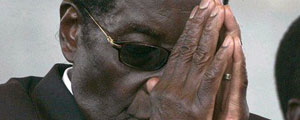
STRONG opposition has emerged against President Robert Mugabe’s push for harmonised elections in March next year, with ordinary Zimbabweans yesterday saying if necessary reforms are not implemented, the country would be plunged into chaos.
Report by Staff Reporters
The electorate joined Sadc and civic society organisations who earlier in the week said it would be suicidal for the country to go to the polls without an enabling environment.
Mugabe told the High Court this week that he would proclaim elections to be held in the last week of March 2013 in his application, seeking the postponement of three House of Assembly by-elections in Lupane East, Bulilima East and Nkayi South to next year.
Judge President George Chiweshe granted the postponement. Prime Minister Morgan Tsvangirai and his deputy Arthur Mutambara were reportedly amenable to Mugabe’s plan, although they insisted that the polls would only go ahead after acceptable reforms have been undertaken.
In a NewsDay snap survey, the electorate insisted that there was need for reforms first before fresh polls to avoid a repeat of the 2008 elections which were marred by State-sponsored violence.
It is estimated that over 200 supporters of the MDC-T and other political parties were killed in the countdown to the June 27 presidential election runoff pitting Mugabe and then opposition leader Tsvangirai.
Thousands more opposition supporters were maimed and displaced during the orgy of violence allegedly spearheaded by State security agents, Zanu PF militia and war veterans, resulting in Tsvangirai pulling out of the race.
- Chamisa under fire over US$120K donation
- Mavhunga puts DeMbare into Chibuku quarterfinals
- Pension funds bet on Cabora Bassa oilfields
- Councils defy govt fire tender directive
Keep Reading
Mugabe went ahead with the one-man poll whose outcome was rejected by regional bodies and the international community, which culminated in the formation of the inclusive government in February 2009.
It is against this background that the electorate is opposed to fresh polls with necessary reforms.
Mavis Chipinda,a resident from Glen Norah, Harare, said the constitution-making process must be finished first before any talks of elections.
“These political parties should not hold elections now because violence is still prevalent in almost every corner of our country and the constitution process must be finished first and then decide on the date of fresh elections,” said Chipinda.
Menelisi Bhebhe from Bulawayo said polls without reforms would be disastrous and the country’s past bore testimony to this.
“Elections always cause problems for us and it is better if they are not held. It is obvious that when the elections are held, we are intimidated and it would be better for them not to be held anytime soon,” said Bhebhe
In Kwekwe, Tawanda Jumo, a teacher and musician, said people were tired and elections would be a noble thing provided they were peaceful.
“We are tired of living on the edge. Having elections will be good if we are assured of peace and a result that will be respected by the political players and Zimbabweans in general. If these things cannot be guaranteed, then there is no use going for polls,” Jumo said.
Lista Sibanda also from Kwekwe said: “We have not seen any benefits after the elections except seeing the MPs and ministers driving top-of-the-range vehicles.”
Students weighed in, saying calls for elections when contentious issues had not been resolved would disrupt the education system that had started to show signs of positive growth.
“We don’t want a repeat of what happened in 2008. We are not guaranteed whether these elections will be free and fair. People were intimidated and there is no guarantee of a non-violent environment election,” Joanah Mungwari, a media student, student said.
Earlier in the week, Sadc-appointed mediator of the Zimbabwe political crisis, South African President Jacob Zuma said: “It is a view of all parties there that by next year, we should have elections.
“I think the question is how do we prepare the ground? Because if we are all agreed that we should have elections, then we should say how do we prepare the environment so that the environment will be conducive indeed for elections. We don’t want to have another election will problems. We want elections that will produce a free and fair result.”
The MDC formations in the inclusive government are pushing for legislative, media and security sector reforms as captured in the Global Political Agreement that gave birth to the coalition administration.







